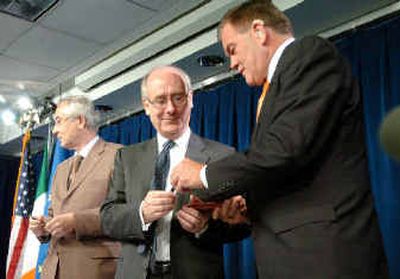Air passenger screening to be scaled back, delayed

WASHINGTON – The Bush administration has decided to scale back and delay the debut of a vast airline passenger screening program until after the presidential election, federal officials said Thursday.
The decision comes after months of meetings with airline officials and lawmakers who pressed the administration to drop more controversial elements of the program, known as Computer Assisted Passenger Pre-Screening Program, or CAPPS II.
Big disagreements about the system remain within the Department of Homeland Security itself, with some officials viewing it as a major aviation security improvement and others fearing it could alienate voters who view CAPPS II as a surveillance system that pries too far into passengers’ lives, sources close to the project said.
Officials have already used some elements of the program and it was scheduled to roll out in airports this fall. Homeland Security officials Thursday could not pinpoint a new start date or provide specific details on what aspects of the screening system would be dropped.
The program “remains, in my mind, one of the most important tools in the counterterrorism arsenal,” said James Loy, deputy secretary of Homeland Security.
But, at least initially, the government would step back from plans to subject all traveling passengers to CAPPS II screens, which marshal multiple government and private databases to assign each flier a risk level using a green, yellow or red color code, officials said. The extra screening may kick in only if a passenger is flagged as suspect under the current system, such as paying cash for their ticket.
Officials said they’re also likely to abandon plans to use system to find passengers wanted for violent crimes.
Instead, sources familiar with the program said Thursday, the government will simply confirm a passenger’s identity by, for example, asking to see a valid driver’s license and then checking its authenticity with a commercial data service. Then an airline agent would match that name against increasingly robust watch lists of known terrorists.
While CAPPS II is on hold, the TSA this summer plans to push ahead with a more popular, voluntary program that allows frequent fliers to become “registered travelers” by providing personal information to the agency, along with a fingerprint or iris scan. If the agency accepts the passenger into the program, which requires a background check, the traveler will get an identification card that allows quicker passage through security lines.
The government’s top security officials once described CAPPS II as the most important new development in preventing terrorist attacks on commercial airliners. The government spent more than $60 million designing a computer system to verify a person’s identity by comparing information from the airline reservation against commercial databases, such as those used by direct marketing firms.
Homeland Security Secretary Tom Ridge indicated that CAPPS II had been canceled in an interview published Thursday in USA Today. But some elements of the program are already being used to check foreign airline crews, some employees working at airports and some travelers who have volunteered in another security screening program, sources said. Officials also said they would continue with plans to test the computer network later this summer using passenger information.
Privacy advocates welcomed the announcement that the program would be smaller and some took credit for forcing the government to reconsider the program.
“It was always a very questionable concept from a security concept,” said David Sobel, general counsel for the Electronic Privacy Information Center, a privacy rights advocacy group in Washington. “The effectiveness was never demonstrated and we always thought it was likely to provide a false sense of security and divert resources.”
But others involved in the issue said the program’s delay continues to leave a vulnerable hole in the nation’s aviation system.
“Aviation security is certainly far too important to play politics with it,” said Sen. Ron Wyden, D-Ore., who sits on the Senate Commerce, Science and Transportation Committee. “The American people have a right to know how the obvious need for air security will be addressed. I believe it can be done and still protect privacy.”
CAPPS II was supposed to begin screening airline passengers this fall, but it faced opposition at nearly every step. U.S. and European airlines initially resisted participating out of concerns that it would require airlines to become part of national law enforcement to track wanted criminals, not just terrorists. Privacy advocacy groups also claimed the government wasn’t providing enough information about how the system would work.